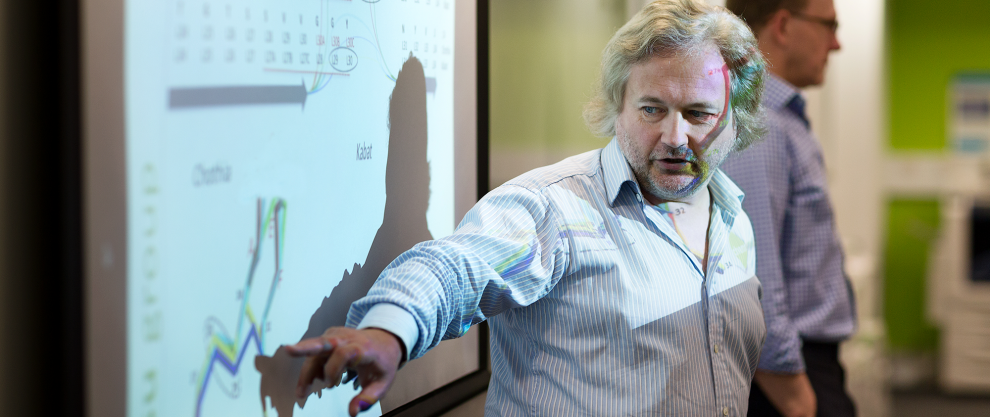
Professor Martin lecturing on the Antibodies workshop
Andrew Martin, Professor of Bioinformatics and Computational Biology
Division of Biosciences, UCL
Andrew Martin's research focusses on structural bioinformatics: developing tools to investigate and understand the relationship between protein sequence, structure and function. Using the abYsis Database, Andrew integrates sequence data from Kabat, IMGT and Genbank and structural data from the PDB to create powerful search and analysis tools for antibody research.
Dr Martin obtained his first degree in biochemistry from Christ Church, Oxford University, where he undertook his research project with Professor Peter Goodford working on his GRID program - one of the first methods for computational drug design. He stayed at Oxford to do his DPhil with Professor Anthony R.Rees and developed the first automated program for modelling antibodies.
He holds a patent related to antibody humanization and has served as an expert witness on a number of international patent disputes. He also acts as a consultant in humanizing antibodies and is an advisor to the WHO (World Health Organisation) International Non-proprietary Names committee on the naming of antibody-based drugs
Kerry Chester, Professor of Molecular Medicine
UCL Institute of Cancer
Kerry leads the Recombinant Antibody Therapeutics Group at the UCL Cancer Institute and is currently President of the Antibody Society. Her main research interests are design and construction of antibody-based therapeutics and the interaction of these molecules with cancer targets. The basic antibody fragment used is the single chain Fv (scFv) and constructs such as scFv fusion proteins with enzymes or albumin are explored. There is a focus on Bench-to-Bedside and the Group has a licensed Production Facility to make antibody-based therapeutics in compliance with Good Manufacturing Practice (GMP). The Cancer Institute offers a unique opportunity for translational work as facilities are available for basic research, pre-clinical testing and Phase I clinical trials.
Dr Mark Swindells, COO Exscientia
Mark is a bioinformatics expert by training and now runs Chemogenomix, a consulting and marketing company in chemo and bioinformatics. He acts on behalf of UCL business-to-market abYsis, UCL's advanced antibody database and analysis workbench.
After studying with Professor Dame Janet Thornton FRS at UCL, Mark moved to Japan where he worked at the Protein Engineering Research Institute in Osaka and Yamanouchi Pharmaceutical Co. Ltd. (now Astellas).
On returning to the UK he was a co-founder of Inpharmatica Ltd., a biotechnology company focusing on knowledge-based drug discovery. He is currently C.O.O. of Ex Scientia Ltd., a drug discovery company based in Dundee, UK.
 Close
Close

